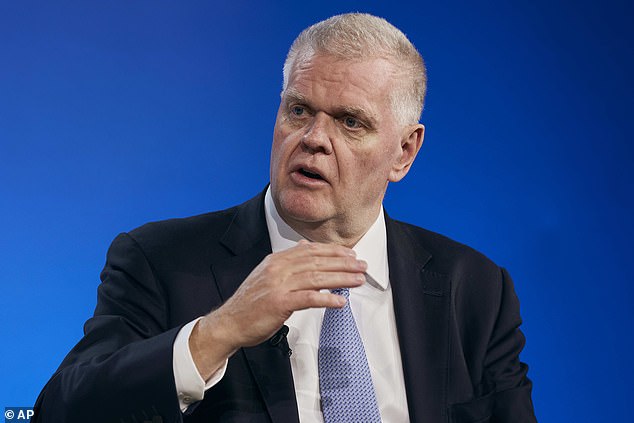Table of Contents
There is something dysfunctional about management and continuity at HSBC.
Chief executive Noel Quinn, after spending seven months auditioning for the top job, decided to step down after less than five years at the helm.
Let’s compare this with the track record of rival global banks. At JP Morgan, Jamie Dimon has been at the top since 2006, Brian Moynihan at Bank of America since 2008 and Bill Winters at Asian rival Standard Chartered since 2018.
Quinn wants a personal break from the top job at the £131bn lender, having criticized its previous strategy of being the world’s home bank.
Left behind were the branch networks in France, Canada, the United States and Argentina. Ambition focuses on core operations in Hong Kong and China. HSBC in the UK, essentially the former Midland Bank, has moved to Birmingham.
Resignation: HSBC chief executive Noel Quinn (pictured) has decided to step down after less than five years at the helm
The strategy has worked. The share price is 15 percent higher than when Quinn took over.
The stock trades at a 60 percent premium to StanChart, which does some of the same things.
In addition to traditional banking, HSBC has extensive trading and investment banking operations serving Asia. It has almost central bank status in Hong Kong, where it is the main conduit between the region and New York.
Doubling down on China before the crisis seemed smart. Except that since then, China’s growth rate has halved, the real estate sector has declined, and suspicion about Beijing’s strategic goals has sparked what amounts to a trade war between the United States and China.
None of this is likely to disturb anyone’s sleep at HSBC’s monumental Hong Kong headquarters.
The bank survived the opium wars of the mid-19th century, Mao’s revolution and found opportunities under the capitalist renaissance initiated by Deng Xiaoping.
There is a mismatch between this story of surviving tumult in the region, including the latest security crackdown in Hong Kong, and the recent leadership at HSBC.
Since Mark Tucker became president, he now faces a third leadership change. Chief financial officer George Elhedery and Nuno Matos, who heads retail banking and wealth, are seen as possible successors to Quinn.
Given that he made his desire to leave known at the beginning of the year, it is extraordinary that the board does not have a successor.
Quinn held off Chinese shareholder Ping An, who owns 8 percent and wants the bank broken up. His premature departure is not a sign of stability.
copper background
Anglo American chairman Stuart Chambers has a daunting task. BHP has opened the door to a takeover, but the Australian bid is unlikely to have the final say. Chambers is rightly consulting shareholders.
An imaginative solution for the London miner would be to determine its own future by eliminating underperforming assets and doubling down on copper without betraying its South African heritage.
As it stands, BHP’s offer is not attractive. It has also irritated South African authorities, who have never forgiven BHP for previous splits.
Other players, including cash-rich Rio Tinto and experienced dealmakers Glencore, will be watching closely.
Copper is the world’s most sought-after commodity and its price of $10,155 per ton is at its highest level in two years.
Glencore is at the forefront of extracting metals for use in a zero-carbon economy. It owns 44 percent of the Collahuasi high-altitude mine in Chile, in which Anglo American has an equal stake.
That’s why he has more than a passing interest in what happens next. It is a major producer of cobalt and nickel, which are key to electric vehicles.
Glencore’s latest forecast, amid strong revenue in its trading arm, is for an underlying profit of £2.4bn to £2.8bn this year. It doesn’t lack firepower.
Good game
The importance of supporting the British video games industry was highlighted during Microsoft’s battle for Activision Blizzard last year.
Games employ 25,000 creators in the UK and contribute £3.7bn to GDP.
Industry body TIGA is urging the next government to put it on equal footing with films with an Independent Gaming Tax Credit and an accelerator program to support early-stage developers. Makes sense.


